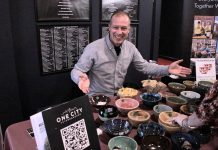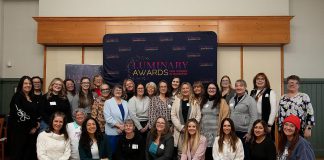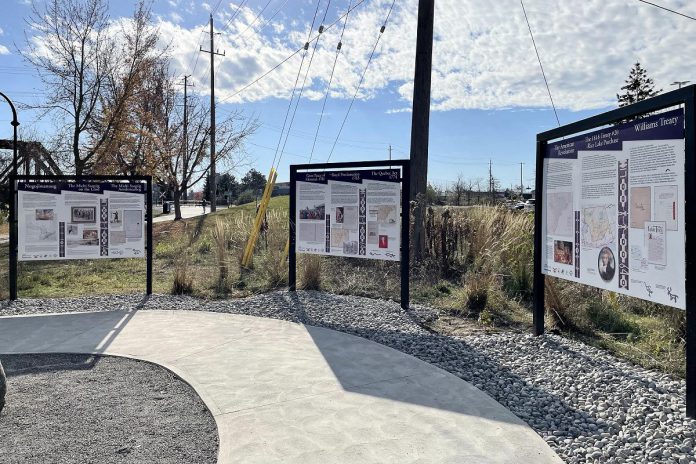
The City of Peterborough is hosting both an in-person and virtual healing circle on Tuesday (June 17) for community members who have been affected by recent vandalism to the Nogojiwanong Project panels in Millennium Park in downtown Peterborough.
Located next to the Trans Canada Trail near the south end of Water Street, the Nogojiwanong Project is a collaboration undertaken in the spirit of kinship between local First Nations, Indigenous peoples, and the City of Peterborough in recognition of the 200th anniversary of Rice Lake Treaty No. 20 — the agreement between the Michi Saagiig peoples and the British Crown that made it possible for Europeans to settle in this region — and the presence of the Williams Treaties First Nations in the region.
Installed in 2019, the three interpretive panels that are part of the Nogojiwanong Project highlight the evolution of local treaties and inherent rights of Indigenous peoples. In 2022, a public artwork called “Gathering” by Anishinaabe sculptor Michael Belmore — a grouping of glacial erratic boulders embellished with the Treaty 20 Clan Dodems — was installed near the interpretive panels.
Last Tuesday (June 3), the City of Peterborough received reports that the interpretive panels had been defaced with graffiti that included racist remarks. When city staff visited the site the following morning, they found that community members had taken the initiative to remove the graffiti themselves.
“This act of disrespect, particularly during National Indigenous History Month, is a painful reminder of the work still needed to advance truth, understanding, and reconciliation in our community,” Peterborough mayor Jeff Leal said in a statement issued the following day. “These panels are more than signs, they are a reflection of the stories, rights, and resilience of Indigenous Peoples, and a vital part of how we share and learn from the land we call Nogojiwanong.”
“Let us use this moment as a call to action, to learn more, to speak out against hate, and to stand in solidarity with Indigenous communities not only this month, but always,” the mayor added.
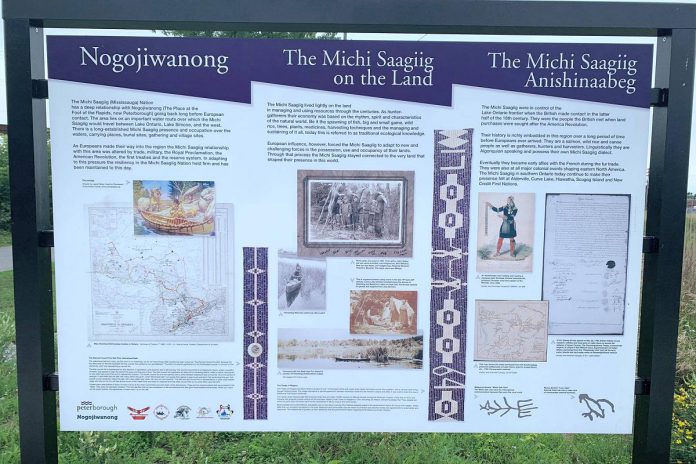
Last Thursday, Peterborough MP Emma Harrison also issued a statement about the vandalism, calling it “both disappointing and disheartening.”
“As June is National Indigenous History Month, and if you haven’t already, I encourage you to visit the site and engage with this important work,” she said. “My sincere thanks go out to the community members who responded quickly to help restore the panels.”
“We are all treaty people, and standing together in moments like this reinforces our shared responsibility to honour and respect that truth.”
Last Friday, the Association of Iroquois and Allied Indians also issued a release about the “outrageous motion of a hate crime,” which included a statement from Chief Laurie Carr of Hiawatha First Nation.
“This is malicious, it is hard to witness that people out there are willingly doing this, and for what?” Chief Carr said.
“It makes no sense except to appease their own hateful thought processes. Regardless of their actions, it will not deter us, as we are a vibrant, proud, independent healthy people. We will not allow this to unsettle us and we will make sure actions will be taken.”
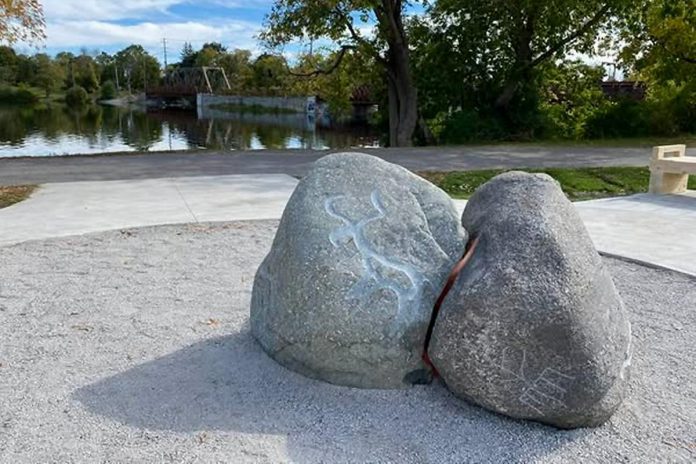
To support those who have been affected by the vandalism, the City of Peterborough is hosting two healing circles on Tuesday, June 17. A healing circle is a traditional Indigenous practice where participants sit in a circle to share stories, express emotions, and support one another in a respectful, inclusive, and spiritually grounded space for healing and reconciliation.
A virtual healing circle will be held first, from 10 a.m. to noon, on Microsoft Teams.
“This gathering is especially intended to support Indigenous community members and allies, offering an opportunity to come together, listen, and contribute to the healing process,” reads a media release from the city, which notes virtual healing circle will be a safe and supportive space.
Space is limited for the virtual healing circle and registration closes at noon on Monday, June 16. Those who register at form.peterborough.ca/Virtual-Healing-Circle-Registration will receive a link to attend the meeting.
Following the virtual healing circle, an in-person healing circle will be held at the Nogojiwanong Project location in Millennium Park from 2 to 4 p.m. Participants are asked to bring their own lawn chair, if desired.
Along with the healing circles, the city has provided a list of resources for people who may need support as a result of the vandalism.
- Provided by Aboriginal Alert – Canada’s Indigenous Awareness Network, Talk 4 Healing is a culturally grounded, fully confidential help line for Indigenous women available 24 hours a day, seven days a week, provided by Aboriginal Alert at 1-855-554-HEAL (4325). For more information, visit www.aboriginalalert.ca/service-providers/talk-4-healing.
- The Canadian Mental Health Association offers a provincial mental health supports directory at ontario.cmha.ca/provincial-mental-health-supports.
- The Kids Help Phone is available 24 hours a day, seven days a week for people ages five to 29 who want confidential and anonymous care from trained responders. Call 1-800-668-6868 (toll-free), text CONNECT to 686868, or visit kidshelpphone.ca for online chat support or to access online resources for children and youth.
- The Hope for Wellness Helplin is available 24 hours a day, seven days a week for First Nations, Inuit, and Métis Peoples seeking emotional support, crisis intervention, or referrals to community-based services. Call 1-855-242-3310 (toll-free) or visit www.hopeforwellness.ca to chat online. Support is available in English and French and, by request, in Cree, Ojibway, and Inuktitut.






